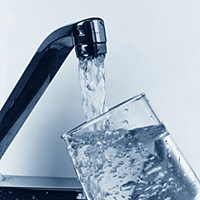
I learned a new word today: "Akrasia." To the ancient Greeks, it meant "knowing the right thing to do, and not doing it." Judging by the four very different discussions of water and our future that I've just read (OK, at 572 pages, the United Nation's latest state-of-the-planet report got more of a skim), we in Canada, and especially in the west, have a bad case of it when it comes to preparing for our new climate reality.
Offsetting the bulky UN report was The Tyee's interview with Maude Barlow, whose new book, Blue Covenant: The Global Water Crisis and the Coming Battle for the Right to Water, (McClelland and Stewart, 2007) repackages the same case for the public commons and water as a human right as did her earlier Blue Gold. Rounding out my reading list were Robert Sandford's Water, Weather and the Mountain West," (Rocky Mountain Books, 2007), by the chairman of the United Nations International Decade "Water for Life" partnership in Canada, and Changing the Flow: A Blueprint for Federal Action on Freshwater, in which a posse of concerned experts issues Ottawa with a call-to-arms.
The UN's Global Environmental Outlook (GEO-4) makes it clear why we should care. We're in trouble, folks. Two decades after the Brundtland Commission warned that we were over-using the planet, this latest assessment finds "no major issues for which the foreseeable trends are favourable." There are too few acres of cropland feeding too many mouths. Too many pipes sucking up or spilling into too many rivers. Ecosystems are shattered and overstretched, triggering the sixth major wave of extinctions in our planetary experience. The weather is changing. "Our common future depends on our actions today, not tomorrow or some time in the future," the report concludes. We need to think hard and act fast.
Wet north, polluted south
Sadly, the three Canadian studies make it plain how far we have to go on either score. Water security is the foundation of every other good thing in life; it is at the centre of habitat survival and climate change risk. And if these authors agree on anything, it is that our cozy assumption of water abundance is a national "myth." All that water is mainly in the north; we live mainly in the south, where water is both over-taxed and frequently heavily contaminated.
Barlow, the most celebrated water lobbyist in the country, continues to preach a stale mish-mash of nature-worship and socialism that serves mainly to prop up her anti-trade bias but stands in the way of real change in the way we manage water. Sandford's thoughtful and thorough Water, Weather and the Mountain West, and the prescriptive manifesto from the Walter and Duncan Gordon Foundation's Water Group, are far more useful efforts: they identify the right threats to our water and, mostly, find the right solutions.
Yet even they tip-toe around the subject we most need to be talking about.
'Outside our . . . capacity to adapt'
The most detailed effort, and the one most focused on the West, is Sandford's comprehensive, if somewhat wandering and bureaucratic, survey of how climate change will melt our glaciers, banish winter snow-pack and leave Prairie and coastal rivers as mere trickles. Echoing the urgency of the UN authors, Sandford warns that regional warming could push temperatures in western North America up by five to 10 degrees Celsius later in the century, a shift he says would be "outside our society's current willingness or capacity to adapt." The director of the Western Watersheds Climate Research Collaborative in Lethbridge, Sandford anticipates global famine, deserts reclaiming the southern Prairies, and a wave of climate refugees flooding into British Columbia and mountainous Alberta that will be "impossible to stop."
In large part, Sandford's book simply sounds a warning to westerners to wake up and smell the weather (with a special, "Yo, you listening?" directed to Albertans). But his prescriptions are down to earth and constructive: more public spending on the science of water and weather, a national policy for the protection of fresh water, renewed federal support for the 98-year-old Canada-U.S. International Joint Commission on Boundary Waters, major investments in more efficient irrigation for agricultural lands, and the development of new institutions for managing water resources framed around the natural geography of watersheds. Sensibly, he recommends we do these things before, rather than after, we undertake the $100 billion job of repairing and rebuilding aging water mains and sewers.
Leaders adrift
It should tell us something that the Gordon Group's blue-ribbon scientists and experts call for essentially the same remedies. Led by Sierra Club water campaigner Tim Morris, the panel brought together ten of Canada's top water wonks, among them Oliver Brandes, who leads the University of Victoria's POLIS project on governing for water sustainability, and James Bruce, the former director of the Canadian Centre for Inland Waters who co-authored a sweeping but largely overlooked study of climate change impacts on cross-border water flows.
After detailing the dereliction of our federal leaders (both Liberal and Conservative) over the past two decades in terms of the drift in national water policy, the experts plead with Ottawa to take 25 specific actions. The most urgent: articulate a national fresh water policy based on individual watersheds while sharply improving our scientific knowledge about water. To help defuse disputes with the United States over water, the expert panel agrees with Sandford that Ottawa needs to restore the luster and authority of the venerable IJC.
Cowed by Barlow?
All of this is good -- so far as it goes. But when it comes to the really tough question, the rubber-hits-the-road point of getting Canadians moving toward water security, both these earnest, well-intended efforts whiff. Sandford sinks into foundation-speak and the ubiquitous passive voice in begging Canadians to develop a green-minded "new water ethic." The Gordon Group cushions its priorities in the cotton-batten language of process. There is scarcely a weightless word from the social-science lexicon omitted as it calls on us to "mainstream climate change into decision-making," as we "formalize a process" and "develop frameworks" to "facilitate decision-making."
My theory: Maude Barlow has even these sensible analysts spooked to the soles of their loafers. So successfully has the anti-trade, anti-business campaigner demonized the private sector from her soapbox at the (presumptuously misnamed) Council of Canadians, that the two most effective means for reigning in our near-criminal waste of water -- raising its price at the tap and allowing markets to allocate it to the most efficient use -- have become a third rail for political ambition in this country.
A full deconstruction of Barlow's rights-and-commons nostrums would require more space than is available here (but see my forthcoming book for the full-court press). The bullets, however, are these: declaring anything a human "right" is a symbolic, not a practical gesture; the "public commons" is quite possibly the most lethal repository imaginable for any environmental asset (think cod fish). As for Barlow's self-promoting resistance to the "privatization" of utility services and the "commodification" of water, it nicely mirrors the religious right in its fight against gay marriage: motivating the faithful to keep writing cheques while doing absolutely nothing to make the world a better place (indeed, rather the opposite).
Call me a grouch, but I am unconvinced that a green moral transformation will soon sweep aside our society's propensity for environmental sin -- or at least laziness. What motivates most people are interests, not virtues. Charge more for water and we will use less of it (while still supplying the needs of the poor). The vast majority of water gets used in the private-sector marketplace where most Canadians also work. Exclude the market from our thinking about water security, and we sacrifice the greatest opportunities we have to use it more wisely.
'Effective market mechanisms'
To his credit, Robert Sandford almost broaches some of these taboo truths. He acknowledges the economic importance of water and (if not in so many words) encourages a greater willingness to pay a price for water that is "related to this value." He also recognizes that if we are to square our economic ambitions with our environmental limits, we'll need to engage in much more active "ecosystem management."
The Gordon Group, while parroting the usual pieties about water rights and commons, also broke with Barlow's orthodoxy at least to a degree. Its report admits that better managing international watersheds (like that of the Columbia River) will necessarily demand closer integration with the Americans on water policies -- if not politics.
But strikingly it took the United Nations to put its finger on the kind of innovative solutions that remain verboten in the world's wettest country. It observes that more than a score of countries are putting "effective market mechanisms" to use to improve water quality, build more efficient water services and allocate water to the most valuable application, all the while protecting in-stream flows, in more than 60 watersheds world-wide.
We could be doing that in Canada too. Instead we have Akrasia. We should get over it, and get on with doing the right thing.





